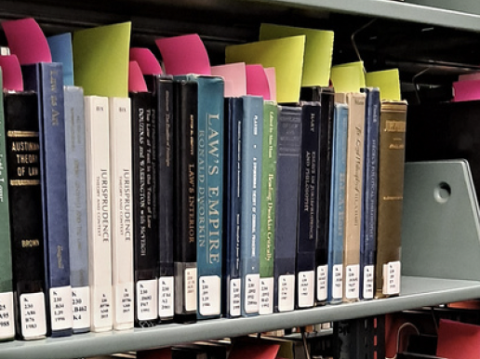
The idea that discarding books is part of a librarian’s job may seem anathema to some people, but weeding a collection is not unlike tending a garden — you need to trim back old growth to make room for the new. Books are weeded for a number of reasons: poor condition, lack of use, or outdated information. By removing these less useful and less used items, we make room for new acquisitions and for other uses of space. There are currently active weeding projects in the Library’s Reference Law section and the general collection.
The first step of the process takes place in the stacks. This multi-step process is carried out by a team comprised of library faculty, Technical services professionals, and College Assistants. Every single book on the shelves is evaluated. Based on age, condition, checkout date, and the surrounding collection, the Collection Development Librarian makes a preliminary recommendation. Books to keep are flagged with colored paper slips. If, as a patron, you see a section of books in the stacks that has a lot of paper slips, that means we are either actively weeding the section, or have recently weeded the section and shifted the books that we want to keep.
After the Collection Development Librarian has made her first pass through a section, books that may be deaccessioned are brought back to Technical Services, where other librarians involved in the weeding project take another look at them before making a final decision. We look at various factors when considering whether to retain a book.
In some cases, a book is deaccessioned and discarded because it is in poor condition and beyond repair. Water damage, broken binding, and paper deterioration are among the types of damage considered. In some cases, we may want to keep a book in our collection, but the condition is unacceptable for circulating. This happens particularly with books that have seen a lot of use. With these books, we usually try to see if we can order a physical replacement copy or an ebook version so that tinformation will still be accessible to patrons.
Stamped checkout and return dates in the back of each book are especially helpful inassessing use at the earliest stage. Whileanalog recordkeeping like this might seem old-fashioned, it allows us to see how recently and how frequently an item has circulated. Once a book that we are considering for discard is inTechnical Services, we can look at more detailed circulation statistics in the online catalog. Books with recent and/or numerous checkouts are much more likely to be retained as part of the collection.
The process of weeding also helps to make us aware of where our collection may be outdated or lacking. As a section is weeded, we may notice that the collection does not include as many new works on a given subject, and that can guide future acquisitions. Age by itself is not necessarily a mark against keeping a book. In some cases, works may be outdated in their content but still hold some historical interest for a contemporary perspective on the era in which they were written. In others, older works may be foundational texts to which the later corpus of scholarly work responds and builds on. The standards for currency also vary by discipline.
Availability within the wider CUNY system or in electronic format is another factor to consider making decisions. Even if a book has notcirculated in a few years, if the information stillseems relevant or we have few otherresources covering the topic, I will sometimesrecommend that we retain it if there are noother copies in another CUNY library and it isnot available as an ebook or via open access. Conversely, if I am on the fence about whether to keep a book and there are numerous other copies available within CUNY or we have another book version available, I am more likely to discard it. The key consideration is whether, by discarding a book, I am making potentially useful information inaccessible. We want to facilitate access to information, not add more barriers.
The College’s focus on criminal justice also informs weeding decisions. Because of the specialized nature of our collection, we serve a community of external researchers in add it onto our primary user base of students and faculty. In a few cases, I have chosen to retain a book or report that it has rarely circulated simply because it is difficult to find elsewhere and pertains to criminal justice. In these cases, I will sometimes look outside the CUNY system to see where other copies are available. To do this, I consult OCLC’s WorldCat, which collects information from the catalogs of member libraries to show where a given work is available. Some of our monographs on international law are held by few other libraries in the United States, and those are worth keeping for research interest.
The weeding process is long, complex, and ongoing, but ultimately it serves to improve the entire collection.
--Ellis Ging
